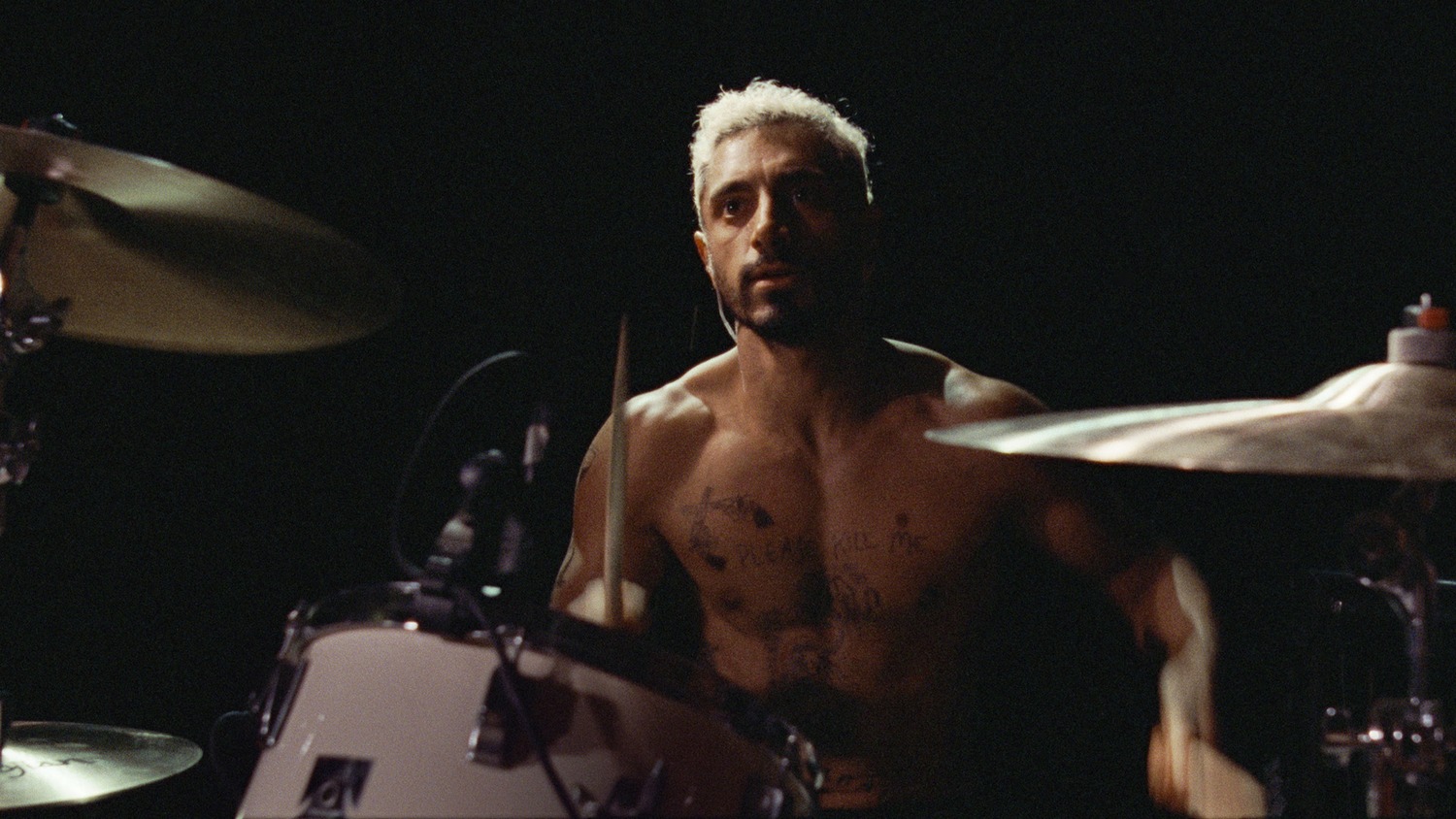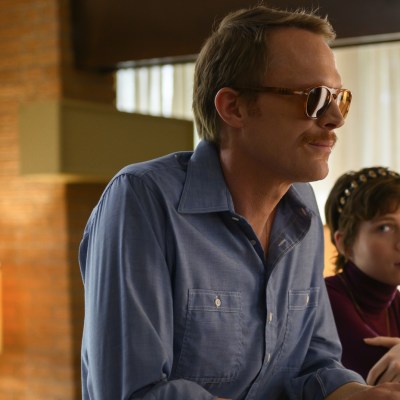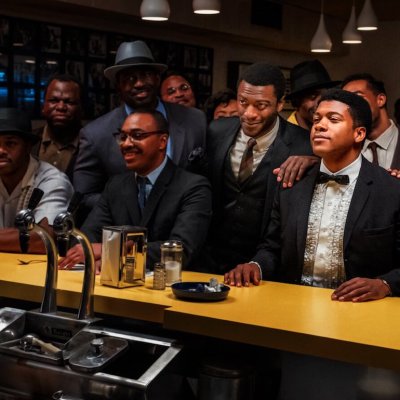First-time director Darius Marder has crafted one of the best movies of the year in Sound of Metal. Riz Ahmed (Rogue One, Venom) stars as Ruben, a recovering addict and heavy metal drummer who tours the country with his musical and romantic partner, Lou (Olivia Cooke). Their nomadic existence is upended when Ruben experiences a sudden, terrifying loss of hearing.
Told by doctors that he may have little to no chance of regaining his hearing, the drummer is convinced by Lou to check himself into a sober house for the deaf. The home is managed by a no-nonsense fellow addict and Vietnam vet named Joe (Paul Raci). Yet even as he settles into a new existence there, learning sign language and teaching drums to deaf children, Ruben is haunted by the urge to find a way to reclaim his old life.
Den of Geek spoke with Marder, who co-wrote the film with his brother Abraham. The director was inspired to prursue the movie by a project called Metalhead that he worked on with friend and collaborator Derek Cianfrance (The Place Beyond the Pines). Metalhead was a documentary/narrative hybrid about a real husband-and-wife noise duo called Jucifer, which Marder used as the springboard for Ruben and Lou’s fictional band, Blackgammon.
“Derek’s such an awesome filmmaker,” says Marder. “He and I, we’re actually quite different in that we come from very different places, very different upbringings, and even our taste is different in ways, but we have this commonality. We just really are interested in this cross section of raw visceral truth and where that meets fiction.”
Marder explains that Metalhead began life as a documentary about Jucifer but became a mash-up of documentary and fiction after the drummer developed mild tinnitus. That narrative thread, along with research and filming that Cianfrance did in the deaf community in Atlanta, provided the seed for what ended up becoming Sound of Metal.
One aspect of Sound of Metal that is apparent right from the start is the film’s authenticity, beginning with the underground metal and punk live circuit that is the basis of Ruben and Lou’s life when we meet them.
“I’ve played a lot of music in my life, and my brother’s a musician as well,” says Marder. “In my teens, I was really in more of that punk hardcore scene and more of the Fugazi and Sonic Youth world of it. But I think that there’s a real commonality in there of experience and visceral raw experience. That was my world from when I was young, so I get really hot and bothered by movies that pretend, that show this fake music and this fake musical experience–it’s just such a bummer.”
Marder adds, “But at the same time, I remember Derek saying to me, ‘I don’t know how you’re going to make this movie, how are you going to do that in a true way?’ That was really the challenge. It was a challenge that really inspired me, it lit me up, because the act of striving for something real is the greatest gift you can give any actor–the act of building something that’s physical and visceral. Almost misguidedly, I scared the living shit out of every single actor I ever met for this role. That was by design.”
The director informed potential stars that they would have to learn to play the drums for real, without resorting to cutaway shots or using another drummer’s hands or feet for the close-ups. The actors would also perform live at a real-life club (the Middle East in Cambridge, Massachusetts) in front of a real audience of, as Marder puts it, “actual music lovers that are specific to this subset of music.” Marder adds that his plan was to make the music sequences “impossible to fake.”
“Instead of saying, ‘I’ll make you look good,’ I’m saying, ‘You better make you look good. You have to own that and there’s no safety net.’ That’s the way we approached it. It’s actually the way we approached everything in this movie. It was the same with ASL (American Sign Language). You can’t just learn the lines, you have to be able to improvise with the deaf community in the same way that Ruben would after, say four to six months. You have to get to that level. That’s your job.”
The reality of living with deafness and becoming part of the deaf community was embraced fully by Ahmed, who took to that aspect of Ruben’s life with the same immersion that he used to approach Ruben’s musical abilities.
“Riz took a dive with ASL that I didn’t take,” recalls Marder. “I was too busy putting the film together. I was also spending a lot of time with the deaf community as I was doing that, but I never got to the level of proficiency with ASL that Riz did. But also Riz is 95 times smarter than I am. I think he must have a photographic memory. He’s extraordinary and his physicality is extraordinary. He doesn’t just learn ASL, he embodies it. Remember ASL is 50 percent in your face. Riz just took to it.”
While Ahmed dove immediately into learning ASL and educating himself about the deaf community, another crucial piece of the puzzle was finding an actor to play Joe, the sober house manager who was not deaf early in his life but lost his hearing in Vietnam.
“Finding Paul [Raci] was really hard,” reveals Marder. “That was a real gamble, and a very hard one because there’s some very nuanced aspects to the character of Joe that he’s playing. He’s late-deafened in the script, a Vietnam veteran, a person who came from hearing culture but went deaf later in life so he doesn’t have the deaf accent in his voice. So there was all these subsets to that character.”
Read more
Although Marder initially looked for a deaf person to play Joe, he says that to get the movie financed he was “encouraged” to look outside the deaf community and meet with some name actors. “Probably the most alluring of them was Robert Duvall,” he admits. “I refused to have a meeting, partially because I said to the agent, ‘I’m not going to say no to Robert Duvall, therefore, I can’t meet with him because he’s not going to do what he can’t do.’ You cannot pretend this. I said, ‘I can guarantee you, he’s not going to want to spend three years learning sign language for a first time director.’”
It was soon after that Marder became aware of children of deaf adults (CODAs): “It wasn’t until I opened it up to CODAs that I found Paul [who is one], and Paul found me, and delivered the tape that just blew me away. Not only is he a two time Vietnam War veteran and has dealt with addiction and taught deaf AA groups, but the man’s been acting for 30 years. It was like finding a Picasso. It was like finding this outrageously talented person just hiding in plain sight.”
Raci’s performance in the film is so natural and so entwined with his own personal experiences that it just provided more verisimilitude to a movie already steeped in the real lives and journeys of people living with deafness. Marder tells us that much of his own experience making Sound of Metal can be summed up by a video he took one morning in Brooklyn, shortly after Riz Ahmed moved there to begin prepping for the shoot.
“I went to go get a coffee early in the morning, as is my pattern,” he remembers. “I go walking up to this coffee shop, I look to my right, and there’s Riz sitting at a table with Jeremy Stone, his sign instructor. They’re just talking in ASL, just having a full on conversation. I stood there watching this guy, on his own steam doing this, which he had been doing every day. I just thought, ‘This is the greatest gift. This is just so extraordinary.’ All those moments I just relish.”
Sound of Metal premieres this Friday, Dec. 4 on Amazon Prime Video.


